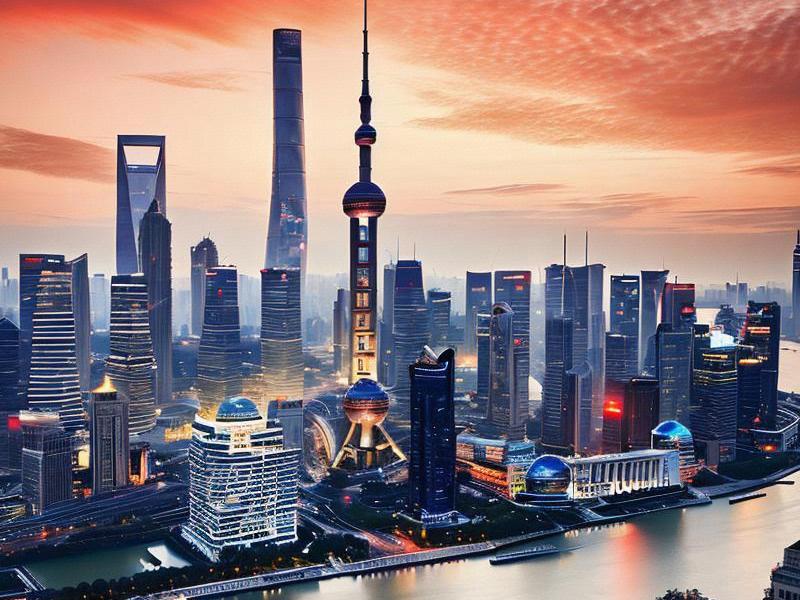
Shanghai, often referred to as the "Pearl of the Orient," has long been a symbol of China's rapid economic development and urbanization. Over the past few decades, this vibrant metropolis has undergone a profound transformation, evolving from a bustling port city into a global powerhouse of innovation and sustainability.
The economic rise of Shanghai is nothing short of extraordinary. In the late 20th century, the city was already a significant industrial and commercial center. However, it was the economic reforms initiated in 1990 that truly set Shanghai on a trajectory of exponential growth. The establishment of the Pudong New Area, a state-level new area in eastern Shanghai, marked a turning point. Pudong quickly became a symbol of China's economic reform and opening up, attracting foreign investment and fostering the development of high-tech industries.
Today, Shanghai is home to some of the world's tallest skyscrapers, including the iconic Oriental Pearl Tower and the futuristic Shanghai Tower. These architectural marvels are not just symbols of the city's economic prowess but also reflect its ambition to become a global financial hub. The Shanghai Stock Exchange, one of the largest in the world, plays a crucial role in facilitating capital flow and investment.
Technological innovation has been a key driver of Shanghai's transformation. The city has invested heavily in research and development, making significant strides in fields such as artificial intelligence, biotechnology, and information technology. Shanghai is home to numerous high-tech parks and incubators, providing a fertile ground for startups and tech companies to thrive.
上海龙凤419足疗按摩 One of the most notable examples of Shanghai's technological advancements is the city's smart city initiatives. Through the integration of advanced technologies such as the Internet of Things (IoT), big data, and artificial intelligence, Shanghai aims to crteeaa more efficient, sustainable, and livable urban environment. Smart traffic management systems, digital public services, and intelligent waste collection are just a few examples of how technology is being leveraged to improve the quality of life for residents.
Sustainability has become a cornerstone of Shanghai's development strategy. As one of the most populous cities in the world, Shanghai faces significant environmental challenges, including air pollution, water scarcity, and waste management. However, the city has taken bold steps to address these issues and promote sustainable development.
One of the key initiatives is the construction of the Zhangjiang Hi-Tech Park, which focuses on green and sustainable technologies. The park is home to numerous clean-tech companies and research institutions, driving innovation in areas such as renewable energy, energy efficiency, and environmental protection. Shanghai has also set ambitious targets for reducing carbon emissions and increasing the use of renewable energy sources.
The city has implemented a comprehensive waste management system, including垃圾分类(垃圾分类)(garbage classification), or waste sorting, which encourages residents to separate recyclables, hazardous waste, and organic waste. This initiative has significantly improved recycling rates and reduced landfill waste. Additionally, Shanghai has invested in green infrastructure, such as urban forests, rooftop gardens, and green spaces, to enhance air quality and mitigate the urban heat island effect.
上海龙凤419自荐 Cultural evolution has been another defining aspect of Shanghai's transformation. Once known as the "Paris of the East" for its cosmopolitan culture and vibrant arts scene, Shanghai has embraced its rich history while also looking to the future. The city has preserved its historic architecture, such as the Bund and the French Concession, while also developing modern cultural venues like the Shanghai Museum, the Shanghai Grand Theatre, and the Shanghai Cultural Square.
Shanghai's film and fashion industries have gained international recognition, with the city hosting major film festivals and fashion weeks. The Shanghai International Film Festival is one of the oldest and most prestigious film festivals in Asia, attracting filmmakers and audiences from around the world. Similarly, the Shanghai Fashion Week has become a global platform for emerging designers and fashion brands.
The city's culinary scene is another testament to its cultural diversity and innovation. Shanghai cuisine, known for its sweet and savory flavors, has evolved over the years, incorporating elements from other Chinese cuisines and international dishes. The city is home to a vibrant food culture, with bustling night markets, fine dining restaurants, and innovative food startups.
上海娱乐联盟 Education has played a crucial role in Shanghai's transformation, with the city investing heavily in its education system to produce a highly skilled and knowledgeable workforce. Shanghai's universities, such as Fudan University and Tongji University, are renowned for their academic excellence and research capabilities. The city has also established partnerships with leading international institutions, fostering global collaboration and exchange.
Shanghai's transformation is not without its challenges. The rapid urbanization process has led to issues such as housing shortages, traffic congestion, and social inequality. The city government has implemented various measures to address these challenges, including the development of affordable housing, the expansion of public transportation, and the promotion of social welfare programs.
In conclusion, Shanghai's journey of transformation is a testament to the city's resilience, innovation, and commitment to sustainability. From its economic rise to its technological advancements, environmental initiatives, and cultural evolution, Shanghai continues to set an example for other cities around the world. As the city looks to the future, it remains poised to embrace new opportunities and challenges, solidifying its position as a global hub for innovation and sustainability.
